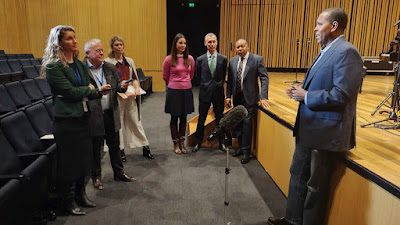
I'm never harsh in my writings here as I feel anyone taking
on the task of jazz is committing to a demanding artistic pursuit with little
obvious remuneration. So I am not harsh
with the Jazz at Lincoln Center Orchestra with Wynton Marsalis. They presented a fabulously capable concert
here in Canberra with skills of a high level and with a hint at modernity. But I felt somewhat underwhelmed. I can feel that way given expectations of
huge names and concert halls full of people I don't see at Smiths (although some
of them were there too, but not all of them) and the very thing of jazz in a
concert hall also has this effect on me.
So how did I find the group? Some
very capable playing and some solos bordering on inspirational; some superbly
sweet harmonies and colours in support.
We don't often see a jazz big band, and it felt more that than jazz
orchestra for much of the concert, so I found it quite educative, too, in
understanding the roles of the sections, the saxes and trombones and trumpets
and what colours were which and how they worked together and why and how the
intensity would grow from reeds to lower brass to trumpets, not to mention the
lovely harmonies inherent in the sections.
Both are obvious but not something I'd too much not put my mind to
before. I was also intrigued by how
often the band would be just the rhythm section and a soloist. It's obvious when you think of it, but so
glaringly obvious when on stage in front of you. I guess it happens in orchestras, too, with
unused players looking distant even uninterested, whereas (mostly) they are
counting and following. But I was taken
by the glorious colours nonetheless. I
found the audio balance a bit odd at times.
I was not so sure of the mix but there were mics on each instrument and
it was obviously mixed. I could mostly identify
an instrument when I thought of it but not always with the presence I
expected. And the playing? Very nice, as you would expect. I was amused by some solo plays between instruments
and admired some more dissonant lines at times and the chops were clearly
always there. Wynton's solos were
immensely capable and always lyrical. I
think my fave was one I heard from him in the rehearsal, a bit more intriguing
in timing and melodic turns while still eminently tonal. And the repertoire? Two sets, each of 5 tunes, and one stangely
muted encore. Set 1 was Monk, Laura, a
fascinating latin outing on Jelly Roll, then a ballad and a baseball theme; set 2 was Wayne
Shorter for Art Blakey, Ellington/Strayhorn, nicely African feels with Man from
Tanganyika from MaCoy Tyner, a very early Mingus love song with vocals (!?!: nothing
like the Mingus I know and admire), an interesting modern 3/4 from trombonist Vincent
Gardner; for encore, a mild blues, Ellington Blues form orbit. I was also amused by Wynton's educative commentary,
I guess introducing the jazz-unwashed into the essence of improv, chuckling while suggesting
he'd missed phrases and the like (not that we noticed!), and giving some background on Jelly Roll and
Art Blakey and Mingus and more. So this
was wonderfully capable, distant being in a concert hall, somewhat of an era,
quite informative and classy. Any
more? In these days of identity, I'll
mention one woman amongst the men and a colour-blind mix of white and black.
The Jazz at Lincoln Center Orchestra with Wynton Marsalis
performed at the new Snow Concert Hall at Canberra Grammar School. The orchestra comprised Wynton Marsalis
(host, trumpet), Obed Calvaire (drums, tambourine), Carlos Henriquez (bass),
Dan Nimmer (piano), Ryan Kisor (trumpet),
Kenny Rampton (trumpet), Marcus Printup (trumpet), Chris Crenshaw
(trombone), Vincent Gardner (trombone), Elliot Mason (trombone), Victor Goines
(tenor sax, soprano sax, clarinet, bass clarinet), Ted Nash (alto sax, soprano
sax, clarinet, flute, piccolo), Sherman Irby (alto sax, soprano sax, clarinet,
flute), Nicole Glover (tenor sax, clarinet), Paul Nedzela (baritone sax, bass
clarinet).























